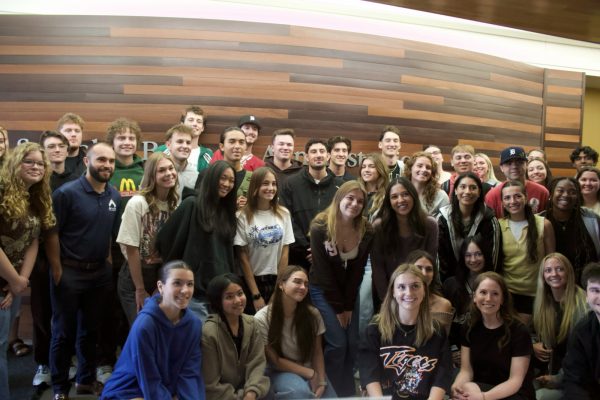English professor named a finalist for prestigious Kingsley Tufts award
Professor Edward Haworth Hoeppner is described by a colleague, Annette Gilson, as a quiet, thoughtful, kind and funny man who cares deeply about his students’ success.
The other thing that strikes Gilson, an associate professor of English, is the depth Hoeppner brings to his writing.
“He weighs his life, our lives, in every poem,” she said. “He is not a poet of the lofty, though his poems make you think and ache deeply, but what I mean is that the people of the world matter to him. He is a poet who carries his society on his back. We don’t know we’re being carried, but if we read the poems, we discover that we are. We discover that he struggles with this world for us, and that we can learn what we need to think about and struggle with by reading his work.”
Recognition
Hoeppner, a professor in the English department and program director for the creative writing major, is one of three finalists for the 2013 Kingsley Tufts poetry award, a $100,000 prize given annually by Claremont Graduate University in California.
His poetry book “Blood Prism” uses blood as a recurring motif throughout its three sections: memory, politics and age.
Hoeppner said he had never had much interest in writing about politics before, finding those issues too remote for his liking. He preferred to write instead about daily life.
His experience of Sept. 11 altered his worldview, and he turned to writing to cope.
“I did find myself, after 9/11, trying to deal with the way history and politics had shifted my field of view, in a way, and I tried then to find a way of talking about social or political things without being abstract, or just thinking through a poem,” Hoeppner said. “I began to try to describe how the unseen world or of events had altered my way of seeing the immediate world, my daily life.”
He feels Sept. 11 had a profound effect on his mood.
“I do tend to write from experience, that is, my effort is always to react to daily life, my experiences and daily recollections, my observations and thoughts inside the particulars of a common event,” he said. “In ‘Blood Prism,’ because of 9/11 and its aftermath, I found that the peripheries of my life had altered, that a different sensibility or context had settled onto my daily moods and preoccupations.”
The creative process
Hoeppner said he writes between 40 and 50 poems a year. Sometimes they come to him and he writes at the spur of the moment, but more often he finds that they come together as a series of images.
“I find that I start with a mood and an image and some simple event or memory — not a subject, really— and then the imagination links one image to another in what to me is often an unexpected and happy series of figurative turns,” Hoeppner said. “I don’t know where I am going, or how the poem will end, but it finds its own way to something I didn’t know I realized, or to a conclusion I have been unaware of until the moment it comes to me.”
After a few years, he has enough to write a book and a different type of spark occurs.
“I put a lot of poems on the floor and I walk around them, and then this odd thing happens: some of them seem almost to lift themselves up, patterns and repetitions, themes seem to link up,” he said. “I get to discover what things I have bent myself toward in the past few years, without being conscious of them.”
Advice for students
Hoeppner said students interested in writing should make it a daily practice.
“Writing is easy enough: you just have to do it, and do it on a more-or-less daily basis,” Hoeppner said. “That takes care of most ‘writing block’ issues, because once you get that practice down, it’s generally hard to keep the imagination from working. Folks who wait until they are “inspired” to write often stop writing before they are 30.”
He also said students should read as much as they can.
“Find writers you admire and read them,” he said. “Find more of these. Read them. Reading and good writing go hand-in-hand. Too many young writers are unaware of what’s being done now, today, by the thousands of writers at work this moment.”





